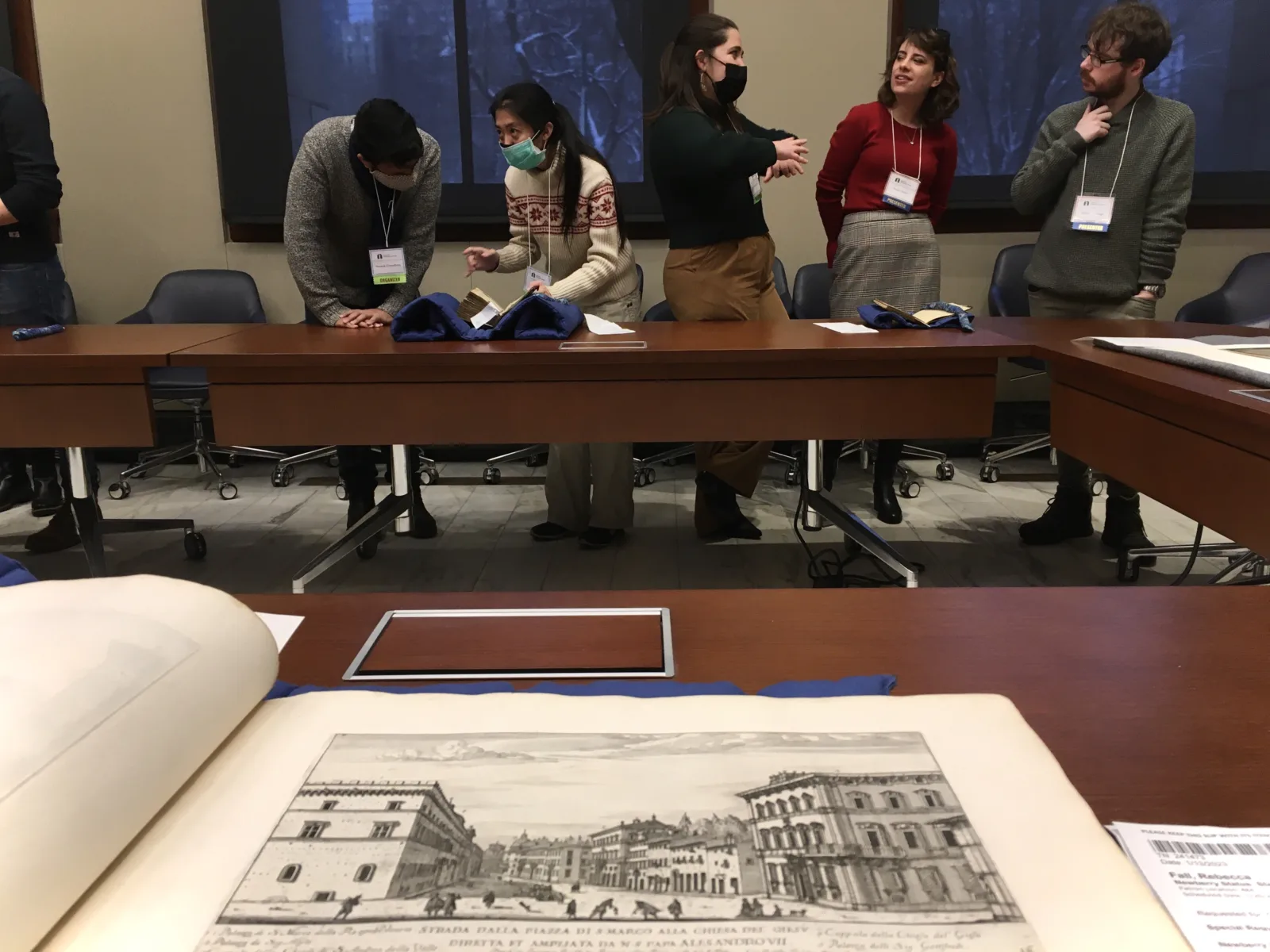Students arrived gradually at the Newberry the morning of Thursday, January 27, 2023, mingling over hot coffee, tea, and some light snacks. Some had taken a bus across the city. Others had traveled two thousand miles across the Atlantic. All looked forward to the start of the 2023 Multidisciplinary Graduate Conference in Premodern Studies.
This conference is hosted annually by the Newberry’s Center for Renaissance Studies (CRS). 2023 marks a return to an in-person format—though the conference retains some hybrid elements—after a two-year virtual stint brought about by the COVID-19 pandemic.
The Newberry regularly hosts academics through an array of programs and fellowship offerings. However, this CRS conference is unique in that it focuses on serving graduate students new to the world of academia. “The culture of academia can be harsh, so we try to make the conference as welcoming, warm, supportive, and fun as possible,” said CRS Program Manager Becky Fall. “We’re attempting to break down the intimidation factor, and we’re known for being a great first conference because of that.” On hearing the presentations, one might never guess that this is a first conference for any of the presenters. They consistently demonstrate a depth of knowledge indicative of serious dedication to their respective subjects.
Across three days, attendees have the opportunity to sit in on numerous panels bearing titles such as “Defining Selves and Others,” “Spectacle and Violence,” “Nature and Mutability,” and “Medievalism Weaponized.” Each panel is composed of three graduate students who present on their subject. Time dedicated to questions routinely transforms into large group discussions, as audience members and panelists create links across specialties and propose novel avenues of inquiry. True to graduate student form, the attendees remain eager to learn from each other, connect areas of focus, and create networks among peers.
Beyond creating a welcoming venue for building networks and sharing research, the conference is specifically tailored to offer opportunities for mentorship and learning. One aspect of this structure emerged from the virtual adaptations of the past two years. This year, prior to meeting in person at the Newberry, participants had the opportunity to engage in virtual workshops, where they were able to share drafts, receive comments, make edits, and practice presentation skills. “We’ve done a lot of experimenting since COVID came on the scene, and the necessity of accommodating hybrid participation really inspired us to think hard about the objectives of the conference itself,” said Fall. “Since the conference has a good reputation for first-timers, we wanted to develop new structures to support folks new to professional academic programs like this.”
Attendees also were invited to two “Meet a Newberrian” sessions during which Dave Weimer (Robert A. Holland Curator of Maps and Director of the Hermon Dunlap Smith Center for the History of Cartography) and Keelin Burke (Director of Fellowships and Academic Programs) provided insights into the opportunities and possible career trajectories awaiting academics. Weimer recounted how his circuitous path from English PhD to Curator of Maps was guided by what interested him, even as those interests changed. Burke took the opportunity to not only illustrate the possibilities offered by fellowships, but also to highlight the plethora of fellowships housed at the Newberry itself. For the conference’s keynote conversation, Yasmine Hachimi, a Public Humanities Fellow, and Molly Yarn, 2022-23 Monticello College Foundation Fellow, spoke at length about the struggle to find one’s footing in academic life. “Your individuality can get lost when you pursue an academic career, but publishing in places that align with your values can help you maintain that,” Yarn says. “You have to know that you are more than your work,” adds Hachimi.
After several days of vibrant exchange, the graduate students depart more confidently than they arrived, equipped not just with new perspectives on their own work but with a broader understanding of the current state of the humanities. Helping students become better prepared to take on difficult scholarship is core to the Newberry’s mission to build, diversify, and sustain communities of learning.
Providing these opportunities to students, free of cost, would not be possible without the support of Newberry donors like you. Thank you for helping us build a strong foundation for aspiring scholars through one-of-a-kind programs like the Multidisciplinary Graduate Conference in Premodern Studies.
This story is part of the Newberry’s Donor Digest, Winter 2023. In this newsletter, we share with donors exciting stories of the work made possible by their generosity. Learn more about supporting the library and its programs.
